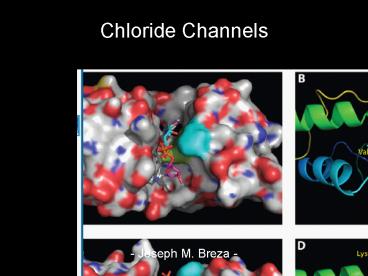Chloride Channels PowerPoint PPT Presentation
1 / 29
Title: Chloride Channels
1
Chloride Channels
- Joseph M. Breza -
2
Chloride Channel Functions
- Membrane potential
- Resting potential
- Facilitate fast depolarization (OFSNs)
- Hyperpolarization (GABA, Glycine)
- Spike timing (ISI, bursts)
- Regulation of cell volume
- Ubiquitously expressed throughout the body and
nervous system - - Olfaction, Taste, Vision, Somatosensory,
Auditory, Muscle, Gut
3
Gating Mechanisms
- Voltage
- Volume (swelling)
- Ligand Binding
- Ion Concentration
- ATP
- Protonation
- Phosphorylation
4
Unlike K Channels, Chloride channels are less
understood.
CaC and CaK channels are frequently coexpressed
and coactivated by Ca2 and help to stabilize
membrane potentials
In general, Cl- channel blockers are dirty and
can block cation current as well
Interestingly, prokaryotic ClC channels function
more as H/Cl- transporters rather Than anion
channels
5
Mutations in chloride channels
ClC-1 - Myotonia Congenita (neuromuscular
disorder) 75 of resting conductance. - shift
in voltage dependency - prolonged depolarization
CFTR- Cystic fibrosis transmembrane conductance
regulator - thick mucous production - effects
the lungs, digestive and immune systems
ClC-2 activated by hyperpolarization, acidic pH
and swelling. KO results in retinal degeneration
or male infertility and spontaneous seizures.
6
Chloride channel types
5-6 TMSs
1 TMS
Ca2 activated Cl- channels 4 TMSs
Assumed to have 10-12 TMSs
12 TMSs With nucleotide Binding domains And a
regulatory domain
Crystallography suggests 18 a-helices
Suzuki et al 2006
7
Stabilization of Membrane Potential
Na
Na
Na
Na
Na
Na
Ca
Ca
Ca
Ca
Ca
Na
Ca
Na
Cl-
Cl-
K
Cl-
Cl-
K
Cl-
K
Cl-
K
K
Cl-
K
K
Cl-
K
K
8
Stabilization of Membrane Potential
Na
Na
Na
Na
Na
Na
Ca
Ca
Ca
Ca
Ca
Na
Ca
Na
Cl-
Cl-
K
Cl-
K
Cl-
Cl-
Cl-
K
K
K
Cl-
Cl-
K
K
K
K
9
Whole Cell Patch Clamp
10
Inhibition of Skeletal Muscle ClC-1 Chloride
Channels by Low Intracellular pH and
ATP Brett Bennetts, Michael W. Parker Brett
A. Cromer
J Biol Chem. 2007 Epub ahead of print
11
Effect of pH on Open Probability
Bennetts et al 2007
12
CBS domains ClC-1
Key residue of ATP common gating
Bennetts et al 2007
13
Role of Histidine Residues in Common Gating
His847Ala
His847Arg
pH 7.9
pH 7.2
Effect of ATP on common gating is abolished pH
ATP effect is reduced
Independent effects of pH and ATP are abolished
Bennetts et al 2007
14
Role of Histidine Residues in Common Gating
pH 7.9
pH 7.2
His835Ala
Not significantly Different than wild type
Bennetts et al 2007
15
Summary
- His847 and His835 (protonatable residues) are
important in the effect of - intracellular acidosis on ClC-1 common
gating. - 2) His847 is important for independent effects of
protons and ATP. - - likely to be involved in the cooperative
actions between intracellular - acidosis and ATP.
- 3) His835Ala mutation separates the ATP effect,
but not the synergistic effect - of acidosis and ATP.
16
Characterization of a Novel Voltage-Dependent
Outwardly Rectifying Anion Current in
Caenorhabditis Elegans Oocytes.
Xiaoyan Yin, Jerod Denton, Xiaohui Yan and Kevin
Strange
Am J Physiol Cell Physiol 292(1)C269-77, 2007
17
Outwardly Rectifying Chloride Channel (ICl,OR)
CLH-3 KO
Whole cell patch
Background current unknown source
Yin et al 2006
18
Open Probability
Yin et al 2006
19
Effect of Zinc and Low pH on Current
Yin et al 2006
20
Channel Selectivity
80
0
-80
Yin et al 2006 (modified)
21
Summary
- Outward rectification is due to
voltage-dependent current activation at
depolarized voltages.
- Rapidly inactivates at voltages more
hyperpolarized than 20 mV.
- SCN- gt I- gt Br- gt Cl- gt F-
- Inhibited by Zinc and low pH (4.8)
22
Calcium-activated Chloride Conductance in Frog
Olfactory Cilia
Steven J. Kleene and Robert C. Gesteland
The Journal of Neuroscience (11) 3624-3629, 1991
23
Chloride Channels in Olfaction
OSN
Northern Grass Frog Rana Pipiens
24
Ciliary Patch Configuration
Cytoplasmic end
Extracellular end
25
Effect of Cytoplasmic Ca2 on Membrane Conductance
Current-voltage relationship
Ca2 concentration
Kleene and Gesteland, 1991
26
Effect of Cytoplasmic Ca2 on Membrane
Conductance w/o Na and K
Kleene and Gesteland, 1991
27
Chloride Dependence on Ca2 Activated Ciliary
Conductance
Percent of Cl- replaced by Gluconate
Reversal potential Shifted to negative voltages
Kleene and Gesteland, 1991
28
Inhibition of Ca2 Activated Cl- Current by DCDPC
DCDPC concentration
Kleene and Gesteland, 1991
29
Summary
- Ciliary conductance increases with an increase
in cytoplasmic Ca2
- Most of the Ca2 activated current is carried by
Cl-
- The Ca2 activated current persists in the
absence of Na and K
- The Cl- channel inhibitor DCDPC reduces the Ca2
activated current by 90

